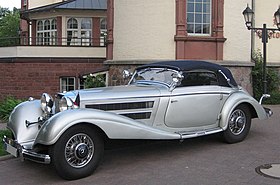Mercedes-Benz 500K
| Mercedes-Benz 500K | |
|---|---|
 |
|
| Overview | |
| Manufacturer | Mercedes-Benz |
| Production | 1934–1936 |
| Assembly | Sindelfingen, Germany |
| Designer | Friedrich Geiger |
| Body and chassis | |
| Body style | 2-door convertible |
| Layout | FR layout |
| Powertrain | |
| Engine | 5,018 cc (5.018 L) I8 |
| Transmission | 4-speed manual optional 5-speed manual |
| Dimensions | |
| Wheelbase | 2,980 mm (117.3 in) (SWB) 3,290 mm (129.5 in) (LWB) |
| Curb weight | Up to 2,700 kg (6,000 lb) |
| Chronology | |
| Predecessor | Mercedes-Benz 380 |
| Successor | Mercedes-Benz 540K |
The Mercedes 500K (type W29) is a grand touring car built by Mercedes-Benz between 1934 and 1936. First exhibited at the 1934 Berlin Motor Show, it carried the factory designation W29. Distinguished from the 500 sedan by the "K" for Kompressor (German for supercharger) only fitted to these performance cars, it succeeded the Mercedes-Benz 380 introduced just the previous year. It offered both a larger, more powerful engine and more opulent coachwork to meet customers' demands for greater luxury and performance.
The 500K used the same independent suspension as had been introduced on the 380, with a double wishbone front axle, double-joint swing axle at the rear, and separate wheel location, coil springs and damping, a world first. Consequently, it was a more comfortable and better handling car than Mercedes' previous S/SS/SSK generation of roadsters from the 1920s, and offered greater appeal to buyers, particularly the growing number of well-heeled female drivers of the time.
Pressing the throttle pedal fully engaged the Roots supercharger, inducing the five litre straight-eight engine to produce up to 160 horsepower (120 kW) and making the car capable of over 160 kilometres per hour (100 mph), while consuming fuel at the rate of up to 30 l/100 km (9.4 mpg‑imp; 7.8 mpg‑US) as it did so.
...
Wikipedia
